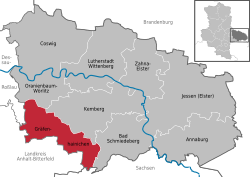Gräfenhainichen
| Gräfenhainichen | ||
|---|---|---|

Church Sankt Marien
|
||
|
||
| Coordinates: 51°43′N 12°26′E / 51.717°N 12.433°ECoordinates: 51°43′N 12°26′E / 51.717°N 12.433°E | ||
| Country | Germany | |
| State | Saxony-Anhalt | |
| District | Wittenberg | |
| Government | ||
| • Mayor | Enrico Schilling (CDU) | |
| Area | ||
| • Total | 158.90 km2 (61.35 sq mi) | |
| Elevation | 90 m (300 ft) | |
| Population (2015-12-31) | ||
| • Total | 11,944 | |
| • Density | 75/km2 (190/sq mi) | |
| Time zone | CET/CEST (UTC+1/+2) | |
| Postal codes | 06773 | |
| Dialling codes | 034953 | |
| Vehicle registration | WB, GHC, JE | |
| Website | www.graefenhainichen.de | |
![]() Gräfenhainichen is a town in Wittenberg district in Saxony-Anhalt, Germany.
Gräfenhainichen is a town in Wittenberg district in Saxony-Anhalt, Germany.
The town was the seat of the offices of the administrative community (Verwaltungsgemeinschaft) of Tor zur Dübener Heide until it was disbanded in January 2011. It lies about 25 km southwest of Lutherstadt Wittenberg, southeast of Dessau and northeast of Bitterfeld on the edge of the Düben Heath.
Nearby lies the Gremminer See, a lake created as a result of the redevelopment of the former brown coal strip mine of Golpa-Nord, and on whose shore is found the Ferropolis ("Iron Town") industrial memorial, actually a museum dedicated to "industrial culture".
Gräfenhainichen had its first documentary mention in 1254. In 1454, Gräfenhainichen had its town rights reconfirmed after the old documents by which these were granted had been destroyed in a fire. In 1637, during the Thirty Years' War, the town was almost utterly destroyed by the Swedes. The year 1859 saw the dedication of the new railway line between Wittenberg and Bitterfeld. The town's advantageous location allowed industry to move into town. The first printing shop was set up in 1874; until 1990, there were still as many as four printing shops in Gräfenhainichen. By 1890, brown coal was being mined in Gräfenhainichen, first underground, and then in strip mines. In 1954, at which time the town was in East Germany, Gräfenhainichen became a district seat (Kreisstadt) for three towns and 27 communities. This lasted until 1994, four years after Reunification.
...
Wikipedia



